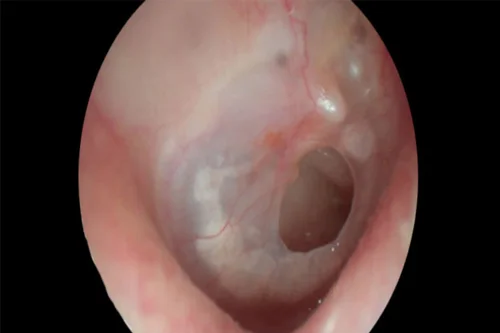Ear Drum Perforations
Ear Drum Perforations

An ear drum perforation means there is a hole or tear in the thin membrane (tympanic membrane) that separates the outer ear from the middle ear. The ear drum helps with hearing and also protects the middle ear from germs, water, and dirt.
Common Causes Of Ear Drum Perforation
- Ear infection : Pus from a middle ear infection can burst the ear drum.
- Injury : Sticking objects (like cotton buds, pins) into the ear can accidentally tear the ear drum.
- Sudden loud sounds : A loud explosion or slap to the ear can cause a hole.
- Sudden pressure change : Such as during flying, diving, or forceful nose blowing.
- Itching or drainage : Ear wax impaction may cause itching in the ear, and in some cases, there may be drainage or discharge.
- Cough : Rarely, when ear wax stimulates the ear canal’s branch of the vagus nerve, it can lead to a reflex that causes coughing.
Common Symptoms
- Sudden ear pain (sometimes pain reduces after the drum bursts)
- Ear discharge (may be watery, pus-like, or bloody)
- Hearing loss in the affected ear
- Ringing sound in the ear (tinnitus)
- Feeling of fullness or blockage
Treatment
- Keep the ear dry : Water entering the ear can cause infection. Plug the ear gently with cotton (lightly coated with petroleum jelly) while bathing.
- Most small perforations heal on their own : Usually within a few weeks to 2 months if there’s no ongoing infection.
- Avoid putting anything into the ear : No oils, no drops (unless prescribed).
- If infection is present : The doctor may give antibiotic ear drops or tablets.
- Surgery (tympanoplasty) : If the perforation does not heal by itself after 2–3 months, or if hearing loss is significant, a simple surgery can repair the hole.
Most ear drum perforations heal on their own
An ear drum perforation might seem small, but if not cared for properly, it can lead to repeated infections and hearing loss. The best way to ensure good recovery is to keep the ear dry, avoid inserting anything inside, and follow up with your doctor. With the right care, most perforations heal without the need for surgery.
